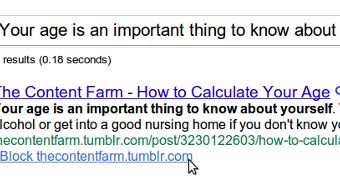Google is taking an interesting step in its escalating fight against webspam, of the content farm variety. It has been increasing its efforts to drive down poor quality results in the ranking, but it is now taking a more direct approach, launching a Chrome extension that enables users to block domains or subdomains from the Google results for all future searches.
The extension helps individual users, but it also helps Google which said it might use the data from the extension users to single out spammy results.
"We’ve been exploring different algorithms to detect content farms, which are sites with shallow or low-quality content. One of the signals we're exploring is explicit feedback from users," Matt Cutts, Principal Engineer at Google, wrote.
"To that end, today we’re launching an early, experimental Chrome extension so people can block sites from their web search results," he announced.
"If installed, the extension also sends blocked site information to Google, and we will study the resulting feedback and explore using it as a potential ranking signal for our search results," he explained.
When installed, the Chrome extension adds a link to all Google search results enabling users to remove all results from that particular source for any subsequent searches.
While most users learn to navigate away from spammy or poor quality results, it's still annoying to stumble upon them over and over again. With the extension you can block them once and for all.
There are a few caveats, the extension works locally, the list of blocked domains is stored on the computer where it's installed. While the blocked sites are sent back to Google, there's no way to sync the list with another computer.
However, Google says this is just a first, experimental step. The company probably just wants to get enough feedback to see if the method could be employed to make the search results better.
If it does turn out to be popular or successful, a better version of the extension may be rolled out. More importantly, it could eventually make Google search results better.

 14 DAY TRIAL //
14 DAY TRIAL //